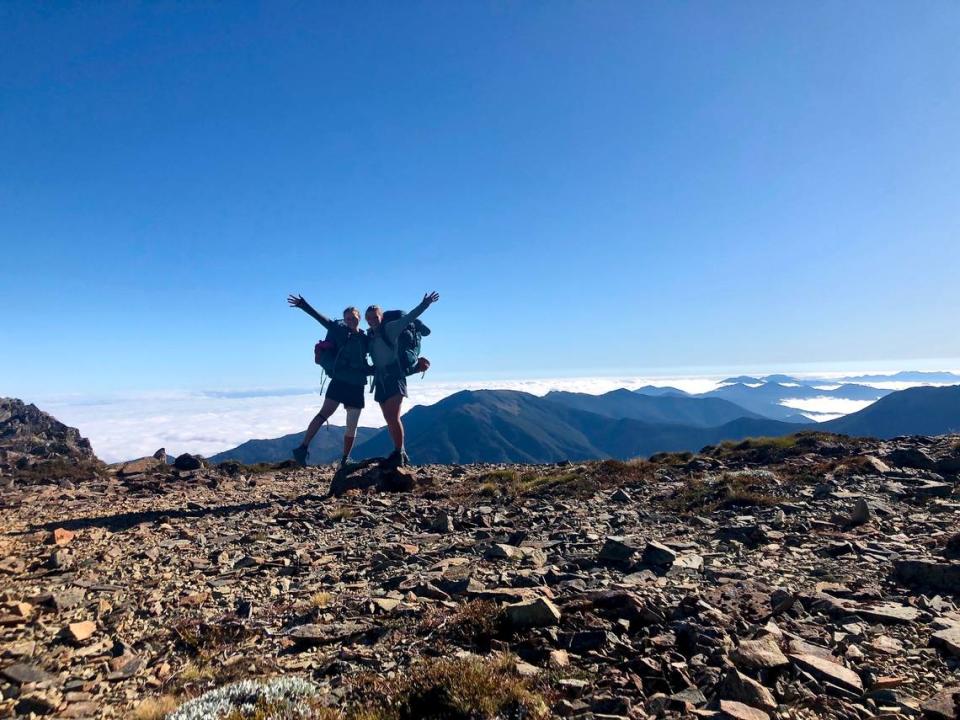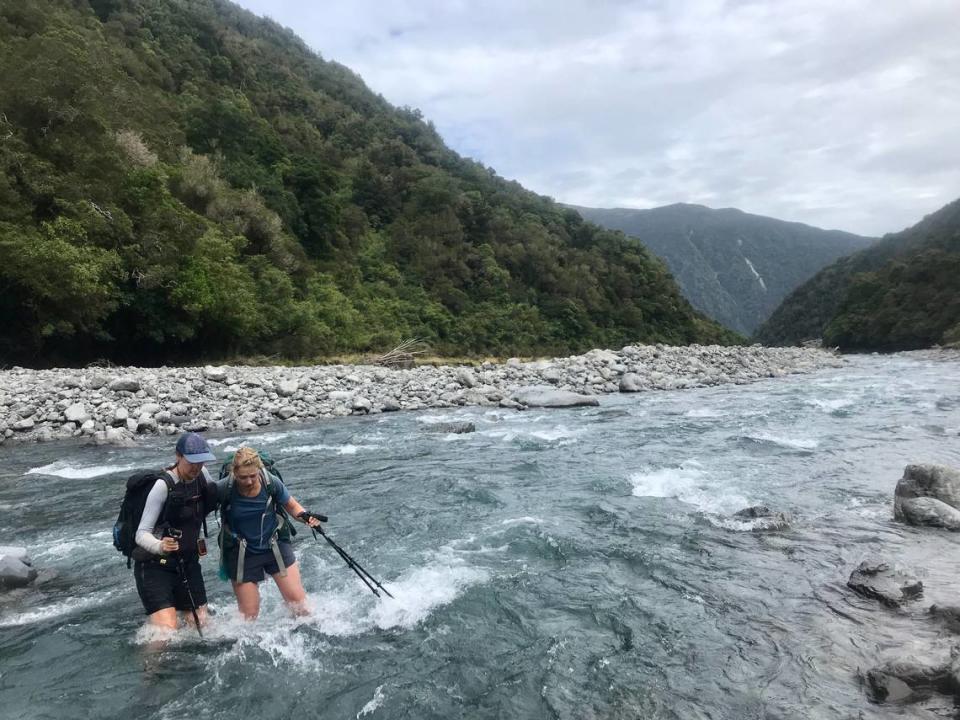After a trio of concussions, this Idaho woman headed to New Zealand to hike and heal
Spending time outdoors has always been healing for Claire Lewinski. And over the last year, she really needed to heal.
After a series of unrelated incidents left her with three concussions in just a few months, the 24-year-old had trouble speaking, balancing and remembering information. She struggled to focus in conversations and on her school work.
As a teenager, Lewinski found refuge in the outdoors around her family’s home in McCall. She grew up hiking, camping, canoeing, fishing and hunting with her family and learned early on that was like a salve for her mental health. She quickly noticed being outside also eased the symptoms from her concussions.
“Outdoors have really been ingrained in who I am,” she said in a video call interview.
So last spring, Lewinski set out on an adventure thousands of miles away from Idaho — thru-hiking the Southern Alps of New Zealand. And when that journey concluded, she started yet another: writing a book to help others understand how hiking can heal.
Struggling with symptoms of traumatic brain injury
In November of 2018, Lewinski was in a car crash in Lolo Pass while driving back to college at Montana State University. She hit a patch of black ice and ended up in a snowbank, passed out from the impact. She didn’t think much of the crash until a few weeks later when, after returning to school, she hit her head on a bathroom shelf hard enough to get a concussion.
“I just kind of brushed it off until my symptoms were really bad,” Lewinski said. “Like I couldn’t actually speak what I wanted to say, and I couldn’t remember my birthday.”
That’s when she learned she may have been concussed during her car accident, too. Doctors advised her to take it easy for a while, and within a few weeks she felt well enough to go to the bar with friends.
“Within 30 minutes I was like, ‘Oh this is not the place where I should be,’ ” she said.
She tried to head home with a friend who was already drunk and later tried to make a sexual advance. When she pushed him away, he punched her in the face. That was her third concussion in less than six months.
This time, the trauma to her brain caused even worse symptoms. Her equilibrium was off, causing her to feel constantly off-balance.
“I would get lost walking to campus, even though I had been going to this campus for four years,” she said. “And I couldn’t find my way around certain buildings because the lights would be distracting. I had headaches. I couldn’t focus on conversation.”
Lewinski’s mother, Lynn Lewinski, said seeing her daughter’s symptoms was alarming.
“I didn’t realize the depth at first until I actually saw her (in person),” Lynn said in a phone interview. “There’s a disconnect in someone’s eyes, and that was really scary for me. And yet I didn’t want to share that fear because I didn’t know how she was (feeling).”
Lynn said her daughter seemed careful not to let on how disorienting her symptoms were.
Lewinski’s friends noticed, too. Ashley Ludack, who met Lewinski their freshman year in college, said she noticed her friend becoming withdrawn.
“There were a lot of struggles that Claire didn’t let the world see,” Ludack said. “She took it all on on her own.”

Hiking became a way to heal
Lewinski found that spending time in nature was becoming a crucial part of her recovery.
“After my last concussion, it was kind of my goal to get back outside again because I felt the best when I was outside, and I felt most like myself again when I was outside,” Lewinski said.
In mid-2019, she decided to pursue a longtime dream — thru-hiking the 1,864-mile Te Araroa trail across New Zealand. She asked Ludack to come with her.
Both women were avid hikers who already had ties to New Zealand. Lewinski grew up traveling to New Zealand each year on a family fishing trip, while Ludack had spent time studying there.
It took a little convincing before Lewinski’s doctors signed off on the idea. Lewinski said her medical team realized it would be a stress relief, which she needed after her symptoms forced her to place her chemical engineering degree and work on hold. Walking the trail would also stimulate blood flow to her brain, which would help her heal.
“Knowing that she needed to disconnect from stress and find a way to heal made it easier to let her go on this great big hiking adventure,” Lynn Lewinski said.
As they planned their trip, the symptoms from Lewinski’s concussions continued to challenge her. She was still struggling to walk without nausea and balance issues, but the trip had become a way of proving to herself that she could recover.
On Jan. 19, 2020, Lewinski and Ludack began their hike. It was a challenge from the start.
“I hadn’t gone on a backpacking trip that was longer than, like, three days,” Lewinski said. “So going from three days hiking to like two months of consecutive days hiking was a big transition.”
Not only was the hike physically challenging, but Lewinski was still dealing with memory loss and trouble focusing.
“I could not organize my thoughts at the beginning, like I got overwhelmed planning for more than a week out,” she said. “I literally couldn’t think that far, so I was really lucky that I had … Ashley to walk with.”
As the two continued their trek, Ludack said she noticed a shift in her friend.
“One thing I really noticed in Claire was this confidence kind of grew out of her as we were on the trail longer,” Ludack said. “Of course, some of that is growing stronger and more comfortable out there … but I also think a lot of it was mentally believing in herself, even on the days that were really hard.”
Even from afar, Lewinski’s mother noticed the change.

“There’s a definite brightness, a joy of living that’s in her again,” Lynn Lewinski said. “A lot of it is in her eyes. As she was able to rest and walk and go through the hike, you could just see this difference starting — a strength and a gladness that hadn’t really been there, hadn’t been connected.”
Lewinski said the hike re-instilled in her the idea that she could enjoy her life. She recalled one particular point when the pair were standing among the Southern Alps, isolated and listening to the wind blow between the mountains. She was taken aback by the solitude and by their accomplishment.
“At that point it was like: ‘This is it. Everything I have come through has been for this moment,’” she said. “Like, no matter how hard my life has been, I still got here. I can still move forward and live.”
Teaching others to take a walk
The trail took Lewinski and Ludack through forests and bogs, across roads and rocky scrambles until they reached the end of their route on March 21. Just days later, the country went into lockdown to prevent the spread of COVID-19.
Ludack was able to reschedule a flight back home to the United States, but Lewinski decided to stay, find work and finish her degree remotely. She also signed up for a writing class that would challenge her to complete a book manuscript in five months. She had tried other projects — learning a new language and picking up the ukelele — to try to challenge her brain, but those hadn’t stuck.
“I’ve always kind of joked about writing a book,” Lewinski said. “And (the class was) a way to be accountable for it, so writing the book was really just another way of recovering. It was like a way to relearn how to learn.”
She decided to write about her concussions, the profound impact they’d had on her life and how nature and the hiking journey in New Zealand helped her reconnect with herself and heal. She called the book “I Need A Walk” and launched an IndieGoGo campaign to fund publication.
Within days, she had surpassed her $5,000 campaign goal thanks to dozens of donors. Her book is scheduled to be published in August.
Lewinski said she hopes she can help people learn about traumatic brain injuries and teach them that recovery is possible.
“Before my concussions, I had no idea what having a brain injury was like and that perspective was completely foreign to me,” she said. “(I wanted to show) how humans can overcome hardship.”


 Yahoo Finance
Yahoo Finance 